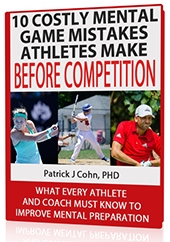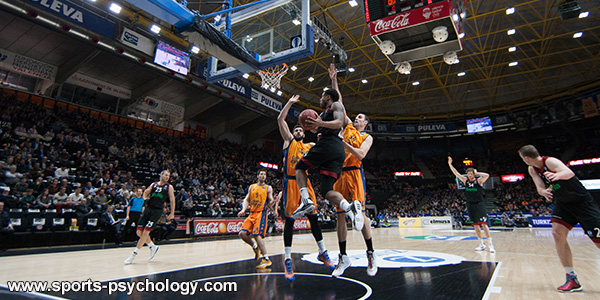How Lebron James Gives 100% at Game Time
Summary: Playing with teammates who make mistakes can be frustrating, but adjusting your mindset and focusing on your own role can dramatically improve performance. Accepting human error, supporting teammates, and using mental cues helps athletes stay versatile, maintain confidence, and become dominant contributors regardless of inconsistent play from others.
The Cavaliers clinched Game 3 against the Toronto Raptors with a score of 105-103 in the 2018 Playoffs. With only eight seconds left, James took charge and sunk a shot just feet from the Raptors’ bench.
In response to that game-winner, James said:
“Tie game, down one. I live for those moments.”
James then opened up and said he’s been doing that since he was a kid in Pampers. He has imagined himself taking those big shots since he could pick up a basketball.
Korver commented on James’ performance and said that he sees him doing shots like those, those “big moment” shots, in practice or when he’s just shooting around.
Korver said that he always wonders why he shoots those kinds of shots…
Well, he does it to prepare himself… to win big games, playoff games.
Some athletes are not willing to go 100% in practice, or even put forth much effort. They slide through practice and go through the motions.
This Mindset Doesn’t Help Players Improve Mentally or Physically
These athletes continuously perform around the same level, maybe 60-70% because practice wasn’t seen as important as competition.
The secret is that you are going to practice way more than you will ever compete, in any sport, and you will play exactly like you practice.
Anything you plan to do in a game or competition, you need to practice in practice. Whether it’s a physical skill, like hitting a game-winner, or a mental skill, such as staying in the present.
It would be difficult to try and give 100% in a game if you don’t practice giving 100%.
Also, you might struggle to score in games like you’ve imagined if those situations aren’t practiced.
Even if you just want to be able to trust your skills and play with confidence in competition, you have to practice that when you train.
As James expressed, he’s been working on those types of shots since he started playing basketball. He doesn’t always have an opportunity to execute, but when he does, he’s prepared because he’s rehearsed it in practice.
Remember, how you play in competition is a direct result of the way you practice. Be prepared for those pressure moments and situations.
Practice how you want to play!
4 Tips to Manage Pressure
1. Adjust Your Mindset Toward Mistakes
Accept that teammates are human and will make errors. Focus on adapting to their play rather than expecting perfection.
2. Focus on Your Role
Concentrate on what you can control in your performance—footwork, positioning, shot selection, and decision-making.
3. Support Your Teammates
Aim to “make them look good.” Encourage, trust, and communicate positively, enhancing overall team performance.
4. Use Focal Cues to Manage Frustration
Before each game, pick one or two mental cues to refocus on when you feel frustrated, keeping your mindset and performance consistent.
Learn how to focus your best under pressure with The Focused Athlete audio and workbook program!
Related Sports Psychology Articles:
- Overcoming Pressure to Preform in Games
- How to Minimize Game Time Pressure
- Do You Pressure Your Sports Kids?
Free Mental Toughness Reports

Get instant access to a mental game report to improve your mental toughness. Are you making one or more of these “deadly” mental game mistakes prior to competition? You can improve your mental game with one of our free sports-specific reports below.
with our free mental toughness reports, you’ll:
- Discover if you have positive or negative pregame jitters.
- Identify your pre-competition mental game mistakes.
- Learn the important pregame mental skills to boost your performance and success!
Learn how mental game strategies can boost your mental toughness in sports with Dr. Cohn’s free mental game reports!
FAQ: Playing Effectively with Teammates Who Make Mistakes
Q: How should I react when a teammate makes an error?
A: Accept that mistakes happen and focus on adapting your play instead of getting frustrated.
Q: Can I control my teammate’s performance?
A: No, you can only control your actions, mindset, and preparation.
Q: How can I support teammates while playing?
A: Encourage them, trust their skills, and focus on playing your role to make the team stronger.
Q: What are focal cues and why are they important?
A: Focal cues are mental reminders or triggers you use during play to stay focused and manage frustration, ensuring consistent performance.
Q: How can adjusting my mindset help my game?
A: Accepting human error, being adaptable, and maintaining focus reduces frustration and allows you to perform at your best consistently.
Dr. Patrick Cohn is an expert mental performance coach who has helped athletes for over 30 years enhance their performance. Dr. Cohn earned a master’s degree in sports psychology from CSUF and a Ph.D. from the University of Virginia, specializing in Applied Sports Psychology.

